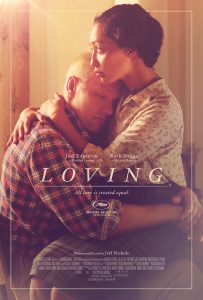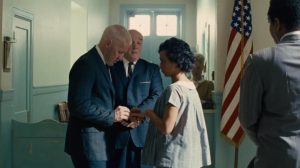
Jeff Nichols had two films released this year, “Midnight Special” & “Loving,” both of which are amazingly similar! Both deal with forbidden love, the former focused on a feared parental bond and the latter on a restricted marriage. The feared parental bond was the result of an alien life form in Michael Shannon’s child, acting as a metaphor on discrimination. The restricted marriage is not a metaphor but a blatant act of discrimination, the state of Virginia apprehensive towards interracial marriages despite Washington D.C.’s approval of it. Both deal with serious subject matters, though the former is much more immediate in its direction. “Midnight Special” moves at a fast pace to match the rapidness of the government’s investigation (the alien child being deemed an immediate threat), whereas “Loving” has a more subdued approach. While the subject matter is immediate (the couple are thrown in jail just as quickly as they are wedded), the direction is quiet and almost forlorn to complement the tendencies of the couple.
The couple are the Lovings, Richard (Joel Edgerton) & Mildred (Ruth Negga), married secretly in D.C. as it’s safer that way. That belief is crushed when the two are ambushed one night and tossed in jail, in contempt of Virginia’s stance against interracial marriage. They try to fight it, but are forced out of the state lest they be tried for upward of five years imprisonment. City life is not suited for them, but a rendezvous at their Virginia farmhouse in order for Richard’s mother to give birth to his child presents the impending threat of the police. They must stay in the city for twenty-five years to avoid jail.

This may sound like a simplification of the true account of Loving v. Virginia and that’s because it is. That’s the beauty of it! Jeff Nichols is known for his understated approach, especially in the face of danger. “Take Shelter” dealt with a paranoid father fearing the apocalypse, but was grounded and quiet nonetheless. The same goes for “Shotgun Stories” and “Mud.” Even “Midnight Special,” as bombastic as it was, was rather reserved at times. Nichols is more concerned with the somberness of humanity and the emotion of the characters than he is the story they’re involved in.
The Lovings are the perfect characters for Nichols, as they are quiet and reserved! They live a simple life in the backwoods of Virginia, working in construction and residing peacefully in their isolated home. They see no harm in their love, even when they ought to know others do. Richard’s mother, Lola (Sharon Blackwood), shows disappointment in her son, not for falling in love with Mildred, but for marrying her knowing the implications. Same goes for Mildred’s sister, Garnet (Terri Abney), who blames Richard for their legal woes, as if it was his master plan to take her sister away to D.C. Throughout the accusations and verbal lashings, the two remain silent; the pain in their eyes and hushed responses telling a story all their own.

That is why Nichols’ direction is so subdued. He isn’t doing so to fulfill his fondness for tranquility, but to complement the nature of the Lovings. They view the world so simply because of their unbridled romance, shrouding their opposition as to not stifle their love. They’re dejected to see society’s rejection of them, any opportunity to fight being squashed immediately. As much as they detest city life, they put up with in return for their marriage and parenthood. It’s only when their son is struck by a car (a moment that feels Hollywoodized, but is factual) that they finally get on defense, moving back to Virginia in protest.
Edgerton & Negga are stellar in their roles! They are given no easy task, having to skip their courtship and get straight to the marriage. There’s no need for a courtship to win the audience over, as their chemistry endeared me to their love. It’s the way they look into each other’s eyes, hang on each other’s every word, and comfortably embrace one another that convinced me of their love. There is a moment in which a photographer for Life Magazine (played by Michael Shannon, as he must be in a Jeff Nichols film) is shooting photos for an article that perfectly captures their love. They cuddle on the couch watching “The Andy Griffith Show,” getting lost in the comedy amidst their drama. They laugh together, Richard putting his head in Mildred’s lap in solace. It is the photo that encapsulated the trial for the country, Nichols beautifully capturing its essence on film!

Edgerton & Negga aren’t the only two actors shining, as Nick Kroll does too in his role as their lawyer, Bernie Cohen. He too relies on body language to convey his emotions, it being visible from his introduction that he’s in way over his head. He exudes confidence around others, but shifts his eyes and fidgets when alone. Before he even indulges that he has little experience in Supreme Court proceedings, we know it through his slight anxiety. As he discusses plans with the Lovings, he struggles to hide his shakiness. It’s not that he’s not competent; on the contrary, he’s a brilliant mind that successfully aided in winning their case. It is that he’s a novice in this field, believing in their cause enough to take it on for free (acting as volunteer attorney for the ACLU). He knows the ramifications if they lose, not wanting to be the
Kroll’s presence helps carry the second half, which admittedly loses steam. It’s still engaging, but not as riveting as the first. I was trying to pinpoint why and it was in thinking of Cohen that helped me figure it out. While the film as a whole is understated, the first half has outbursts of high tension thanks in part to governmental interference. The arrest of the Lovings and the impending threat of their detractors kept me on alert, providing a subtle sense of dread throughout. That was lost a bit in the second half, as the government interference is hidden from the screen. Sure, Richard’s paranoia keeps their presence in mind, but they become invisible villains. Thanks to this, the Lovings’ struggle doesn’t seem as serious as it was, their ability to live in a secluded farmhouse in Virginia not feeling that much at risk. Cohen acts as the intermediary, keeping the second half from dissolving.

The lack of a forthright villain in the second half is easily explained away as the local police having to remain detached in regard to the Supreme Court’s investigation. I appreciate the subtlety of that explanation, though it is curious that Nichols didn’t rely on brief exposition to do away with this concern. He ever so often infuses his script with exposition, such as in Cohen’s aforementioned neophyte confession and Richard’s friends informing him that he is now feeling the persecution they’ve felt all their lives. Nichols carefully makes each instance feel organic as opposed to obligatory, the high emotions of the characters bringing out their elucidation(s).
The second half, while not as powerful as the first, still resonates, bringing to the Loving v. Virginia case to film splendidly! It never feels hamfisted or forced despite the tendencies of these films to come across as such. It is thanks in part to Nichols’ subdued direction and the fantastic performances all around that “Loving” feels earnest and not trite! The Lovings deserved this wonderful treatment!
Final Rating: B+
